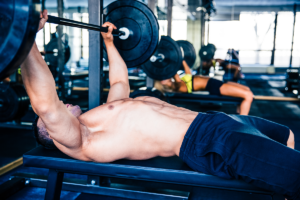
Everyday Chemicals Are Screwing Up Your Testosterone
You may have already read my other article on 7 habits which are killing your testosterone. There was a section in that on Water because

Understanding the buzz around beta-alanine benefits can be a game-changer for fitness enthusiasts and athletes. From taking it pre-workout to boost performance to potential anti-aging effects, discover why this amino acid is a favorite among health buffs.
Beta-alanine is a non-essential amino acid vital for producing carnosine along with histidine. This compound regulates pH levels in muscle cells, essential for delaying muscle fatigue and optimizing exercise output.
It’s important to note that while histidine is a crucial component in creating carnosine, most people typically have sufficient levels of histidine from dietary sources. Beta-alanine is the rate-limiting factor in carnosine synthesis, meaning it’s usually the limiting component.
Carnosine, a dipeptide formed from the combination of beta-alanine and histidine, plays a pivotal role in our body’s defense mechanisms, particularly in the realm of antioxidant protection.
One of the most outstanding benefits of carnosine is its capability to neutralize free radicals. Free radicals are unstable molecules that, in excess, can damage cells and contribute to aging and diseases. Carnosine effectively scavenges these harmful molecules, preventing potential damage to our DNA, proteins, and cell membranes.
But the antioxidant power of carnosine doesn’t stop there. It also helps combat oxidative stress, a condition resulting from an imbalance between free radical production and the body’s ability to counteract their harmful effects.
Oxidative stress can be a precursor to a plethora of health issues, from inflammation to chronic diseases. With carnosine’s intervention, the body finds better equilibrium, ensuring that the oxidative agents are kept in check, preserving cellular health, and potentially slowing down aging processes. This dual action—neutralizing free radicals and countering oxidative stress—makes carnosine a valuable asset in the body’s fight against cellular damage.
When considering supplementation to boost muscle carnosine levels, it might seem intuitive to directly supplement with carnosine.
However, beta-alanine supplementation has emerged as the preferred method, and here’s why: When ingested, carnosine is quickly broken down into its constituent amino acids, beta-alanine and histidine, in the digestive system before it can be absorbed into the bloodstream.
As a result, direct supplementation with carnosine is less efficient for increasing muscle carnosine content.
On the other hand, supplementing with beta-alanine directly bypasses this breakdown, allowing for a more effective increase in muscle carnosine levels. Furthermore, the body typically has ample histidine, making beta-alanine the rate-limiting factor in carnosine synthesis.
Thus, by supplementing with beta-alanine, one ensures a more targeted and efficient elevation of muscle carnosine levels, optimizing the potential benefits for athletic performance and other health advantages.
Beta-alanine shines in its ability to boost athletic performance. It ramps up carnosine levels in muscles, reducing acidity during intense workouts. As a result, athletes can push harder and longer. Studies, like the one in the journal “Amino Acids,” showcase the consistent advantages in short-duration high-intensity exercises.
But it’s not just about endurance. Beta-alanine supplementation also supports muscle growth. Research indicates that regular beta-alanine intake can significantly increase lean body mass over time, a boon for bodybuilders and strength trainers.
Beyond muscles, beta-alanine is a cellular defender. Its antioxidant properties neutralize harmful free radicals, supporting overall cell health.
Emerging studies hint at beta-alanine’s role in slowing down aging processes. Thanks to its effect on carnosine levels, it may protect body proteins from age-related damage.
Beta-alanine is a non-essential amino acid, which means our bodies can produce it. However, certain foods also contain this compound or help increase its levels in the body, albeit indirectly.
Direct dietary sources of beta-alanine are relatively limited because beta-alanine in foods is typically bound in the form of the dipeptide carnosine, and to a lesser extent, anserine and balenine. When you consume these dipeptides, they’re broken down into their constituent amino acids during digestion.
Here are some of the top foods that contain carnosine, which subsequently increases beta-alanine levels when consumed:
It’s worth noting that vegetarian and vegan diets typically contain lower levels of carnosine and, by extension, beta-alanine, because the primary sources are animal-based.
For individuals following these diets and looking to boost beta-alanine levels for athletic purposes, supplementation might be considered, but always under the guidance of a healthcare or nutrition professional.
While dietary intake can provide some beta-alanine, those seeking its ergogenic (performance-enhancing) benefits often turn to supplementation to achieve the doses shown to be effective in research studies.
Zeroing in on the perfect beta-alanine dosage can vary. Factors like body weight, workout intensity and diet matter. However, a general guideline from scientific reviews suggests about 1.8 – 6 grams daily with higher dosages more important for endurance athletes and split into 2 doses for best results.
This means 2 – 3 grams in the morning/early afternoon or pre-workout and another 2 – 3 grams in the late afternoon/night post-workout.
Taking more than 3g in a single dose is not recommended for first time users as it can cause extreme tingles aka “paresthesia”.
One of the most commonly reported sensations by individuals after taking beta-alanine supplements is a tingling or prickling feeling, often referred to as “paresthesia.” This sensation is usually felt on the skin, especially in the face, neck, and back of the hands.
While it might be startling for first-time users, it’s a well-documented and a perfectly harmless side effect. The tingling typically begins 15 to 20 minutes post ingestion and can last anywhere from 60 to 90 minutes.
The exact cause of this sensation is not entirely understood, but it’s believed to be related to beta-alanine’s effect on specific nerve receptors in the skin. Some individuals seem to be more susceptible to this sensation than others, and its intensity can vary based on the dosage taken.
Beta-alanine’s impressive array of health benefits makes it a standout in the world of supplements. Whether you’re an athlete seeking that performance edge or just looking to boost overall health, beta-alanine is worth considering to add to your supplementation regimen.
Just remember, you should always consult a healthcare provider before trying any new supplement.
Studies

You may have already read my other article on 7 habits which are killing your testosterone. There was a section in that on Water because

Rhodiola Rosea stands out as a potent adaptogenic herb with a rich history of traditional use and a growing body of scientific research. Revered for

In this comprehensive article, we will explore what L-tyrosine is, its benefits as a pre-workout supplement, the correct dosage, and other potential health benefits it

Betaine anhydrous is becoming an increasingly popular ingredient for pre-workouts. In this article, we will explore the fundamentals of betaine anhydrous, its connection to carnosine,

Beta-alanine is a pre-workout powerhouse. From boosting workout performance to potential anti-aging effects, discover why this amino acid is a favorite among health buffs.

You may have already read my other article on 7 habits which are killing your testosterone. There was a section in that on Water because

Rhodiola Rosea stands out as a potent adaptogenic herb with a rich history of traditional use and a growing body of scientific research. Revered for

In this comprehensive article, we will explore what L-tyrosine is, its benefits as a pre-workout supplement, the correct dosage, and other potential health benefits it
Discount Applied Successfully!
Your savings have been added to the cart.